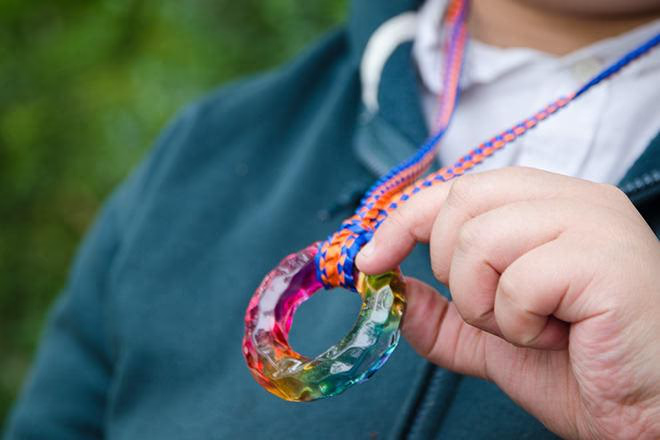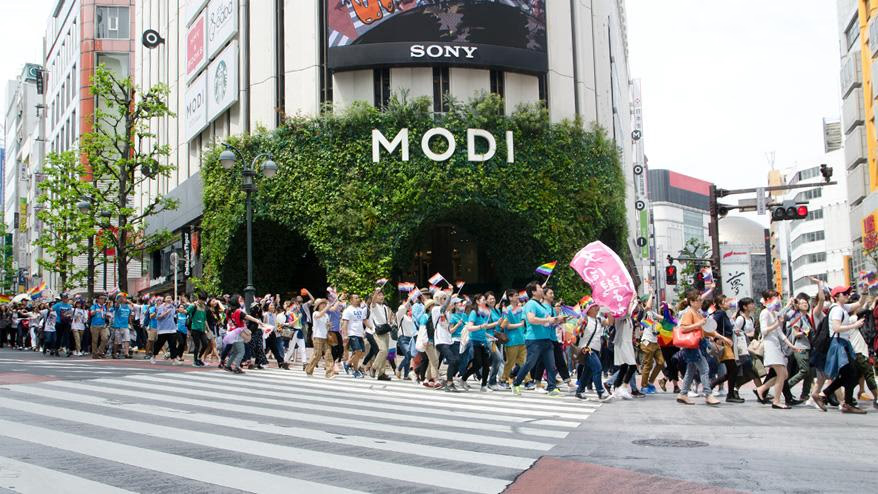Hello. This is Inui from the Quality Control Department.
In my previous article , I explained why I am learning about LGBT *1 .
This time, I wanted to find out what other people who are involved with LGBT and related issues feel, think, and are involved in society, so I interviewed three friends I met at Prism, an LGBTs *2 club at Hosei University that I belonged to last year.
The event took place at the Tokyo Rainbow Pride 2017 *3 (TRP) event venue, and we spoke with them on May 7th, the final day when everyone was gathered together.
This time, we will introduce the story of one of them, Ochazuke-san.
Ochazuke is a university student and the representative of "Prism".
I met Ochazuke when I participated in an LGBT student exchange event organized by a certain NPO in the spring of my fourth year of university. I was thinking about joining a community to learn more about LGBT issues, and Ochazuke called out to me.
I learned a lot from Ochazuke by joining the club, but because there were so many members, I didn't have much opportunity to talk to him in depth, so I decided to interview him again to find out why he decided to create the club, what his thoughts are on sexuality, and how he felt about participating in TRP.
*1.2 What is LGBT/LGBTs?
It is an acronym for lesbian (female homosexuals), gay (male homosexuals), bisexual (male homosexuals), and transgender (those whose gender identity does not match their physical gender, and who cross gender boundaries). Currently, it is often used as a general term for sexual minorities. The addition of the "s" to "LGBT" means that it includes all sexualities, not just the four mentioned above (sometimes it is called LGBTQ). Some members chose Prism because it had the "s" in the name.
*3 What is Tokyo Rainbow Pride?
This is the general term for events organized by the NPO Tokyo Rainbow Pride, which aims to create a society in which each individual can pursue happiness in a more true to themselves manner, without being subjected to discrimination or prejudice, regardless of sexual orientation or gender identity (SOGI).
(Quoted from TRP 2017 "About the Event" )
Ochazuke's profile: Representative of the LGBTs club "Prism" at Hosei University. Currently enrolled in the Faculty of Letters at the same university.
I founded Prism when I was a sophomore in college, and the end of June 2017 will mark our two-year anniversary.
The group made an appeal on Twitter, and the number of members has grown from an initial 5-6 people to about 70 today.
I still don't know my sexuality
Creating a place for people who don't want to make decisions
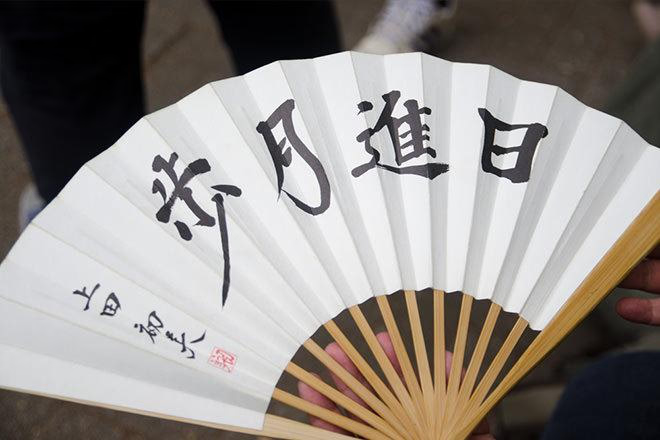
Ochazuke's favorite fan. A popular item in his hobby, shogi. The "Nichishin Geppo" folding fan he had on the day is said to be filled with his thoughts on society. He said he feels calm when he has it, and he held it in his hand throughout the interview.
- Why did you decide to start "Prism"?
Ochazuke: I created this club because I felt it would be reassuring to have it in the school I attend, and I thought it was important for it to be close by.
In LGBT clubs at other universities, the so-called "L," "G," "B," and "T" are easily visible, and it's a comfortable environment for people who have identified their sexuality. However, it's difficult for people who don't know their sexuality yet or don't want to decide.
I felt that it was wrong to create a minority within a minority, so I wanted to do something about it.
I wanted to create a place where people could make friends and companions, even if they didn't want to make their sexuality public.
- What made you think that "some people don't want to decide their sexuality"?
Ochazuke: I've been unstable since I was little, but I didn't have much support.
I think it's easier to take action once you realize you're a sexual minority, but it's exactly when you're confused or worried, thinking, "Maybe I am," that you need support the most. I felt like there were no support or comfortable places for those times. So I thought it would be great if there was a place like that.
- Have you had that kind of thinking since you were a teenager?
Ochazuke: That's right. I was also struggling with this issue when I was a teenager, but I didn't think there was anyone who would support me. When I came out to a classmate in high school, he took me to an event run by a certain NPO.
There is an unspoken understanding that you have to declare your sexuality as ___, and there is no encouragement such as "If you don't want to say it, you don't have to."
Some people don't even want to say, "I don't want to say it."
So I thought that if people like this could connect with each other, we might be able to move forward a little bit.
- Do you feel like it's not important to talk about your sexuality?
While it's true that Ochazuke-san is an important part of life, the rules and atmosphere are created in such a way that sexuality is only seen as a "part" of a person.
Of course, there are people who want to connect with people of the same sexuality, so we strive to make it a comfortable place for everyone.
It's fine to define sexuality in words, but I don't think it's necessary to define it in words because it's different for each person.
We also decided that people don't have to say anything they don't want to say, such as the name of their university or their real name.
- What kind of activities do you usually do in the club?
We do sometimes plan things as a club, like having a New Year's party or going to TRP together, but our main purpose is to make friends, so we draw lots for topics that people write anonymously and then have a snack party where we talk about them.
For example, there are serious topics like "How many people have you come out to?" and casual topics like "What did you have for lunch?", so anything is OK.
Some members want to hold study sessions, so we attend academic conferences and share information about lectures and events.
Being able to discuss and talk about your worries with friends of the same age is a sense of security that only university students can offer.
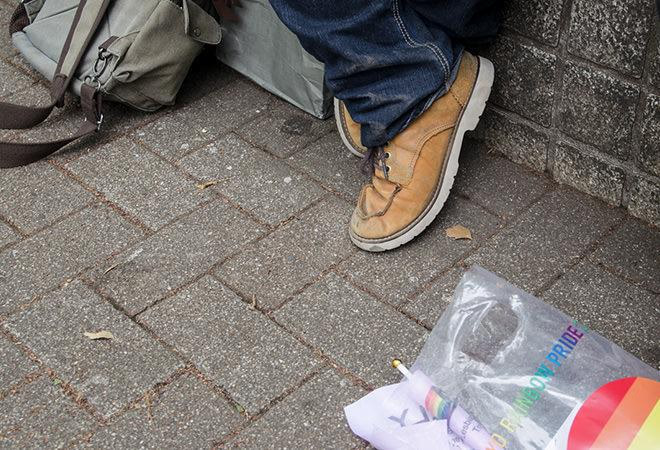
- Does your family know about this kind of activity?
Ochazuke-san didn't say it himself, but it seems like he was found out without even realizing it...
He asked me questions like, "Is there something you're hiding?"
I understand how my parents feel, but I would like to come out at my own timing, and I would be happy if they didn't rush me too much.
Even if the person on the receiving end is ready, the person confiding may not be.
- So you want to leave it up to the person's timing. Has your relationship changed since then?
Ochazuke's parents think they understand each other, but he feels that they can't understand each other.
It took me a long time to accept that I was a minority, so I don't think it's something I can change right away.
However, regardless of sexuality, I think it's difficult to completely understand another person, so through coming out to my parents, I realized that it's important to try to understand and accept others.
It's natural that they should be there,
What can be done to change the everyday life that has become "non-existent"?
How do you participate in TRP?
The main purpose of Ochazuke-san is to learn and exchange information.
It is rare for so many groups to come together in one place, so this is a great opportunity for everyone to network.
I am looking for things that could be useful for Prism, such as asking about the activity policies and management tips of other organizations. We are also thinking about creating a forum for discussion, where we can exchange information about study sessions.
However, it's also a fun day when everyone can get together and have fun, so there's nothing to be nervous about. You can enjoy shopping, eating delicious food, and other things casually, so I also come here with a festival-like feeling.
- I was surprised at how bright the atmosphere at the venue was. Did you notice any changes in the way you looked at yourself or in your feelings during the TRP period?
I can see rainbow-colored signs all over town, so I wonder if they'll support me? Or will society change? I can have hope.
I believe the TRP parade is meant to make sexual minorities visible and eliminate prejudice, but I have never participated in it.
I really want to participate, but I'm worried that my family might be prejudiced if they see me on TV, and I also don't think that just walking in a parade will change society, so even though this is my fourth year participating in TRP, I still can't walk in the parade.
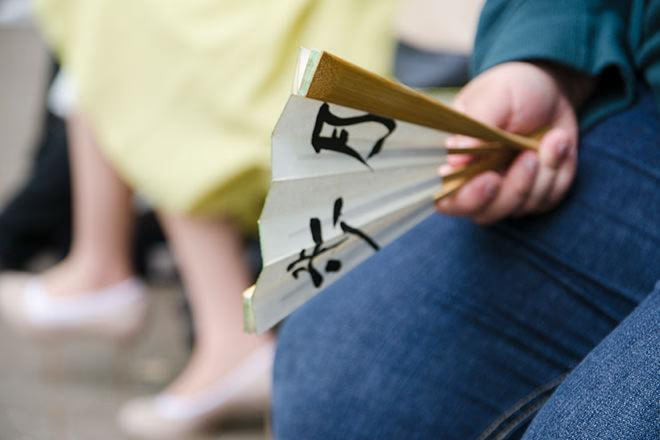
- I see. Today is the last day of TRP, and companies are also participating, so it's a lively event.
Do you ever feel a gap between the excitement and what happens after the event ends?
Ochazuke: Sexual minorities should naturally exist, but it feels like this is only normal here and that in everyday life they are "non-existent."
- When do you feel that way?
For example, when you hear a gay joke. When you say "Are you gay?", I think the premise is "You're not gay, right?". Some people say "Okae talents are creepy," but I wish they wouldn't group them together by attribute.
In the first place, it is impossible to live your life entirely as part of the majority, and it is possible that you may be a minority without even realizing it.
I think that "we just happened to be a minority in sexuality." It's something we can't choose, and there's nothing we can do about it even if people say things to us.
- Besides not making discriminatory remarks, is there anything else we can do in our daily lives?
This may be difficult for you to say, Ochazuke-san, but if there are people who make gay jokes , I would be happy if you would say something like, "Stop doing that," or "There are more people than you would expect."
When I hear stories like that, I feel like it can help someone, and it makes me feel happy and makes me feel more comfortable being here.
I don't mind being asked about things I don't understand, so if you're unsure how to respond, please ask me.
It's impossible for everything in life to be part of the majority.
During this interview, Ochazuke-san's comment "It's impossible to live a life where everything is the majority" left a strong impression on me. Sexuality is only one part of what makes up a person, but I think that it may be especially prone to becoming stereotyped in a society where the gender binary is so deeply rooted.
In fact, there were many other LGBT clubs at the LGBT event I attended during my senior year of college, but most of them had a policy of only allowing LGBT people to be active as members.
However, I think Ochazuke-san approached me because he sees everyone on an equal footing. For the first time since I started working at Prism, I had the experience of interacting with people without judging them by gender and respecting their individuality, and I found it very comfortable. I am grateful for this valuable experience.
The next part will be the second interview. We interviewed two couples from Prism.
I hope to share with you how close these two are, to the point that it will put a smile on your face. Please look forward to it!
bonus
TRP Event Report
Finally, we would like to show you what the TRP venue looked like this year (2017).
As it was my first time participating, I was a little nervous when I headed to the venue. When I arrived, the venue was so lively that I was overwhelmed for a while.
People who came to Yoyogi Park without knowing about TRP probably got the impression that it was a fairly large-scale festival.
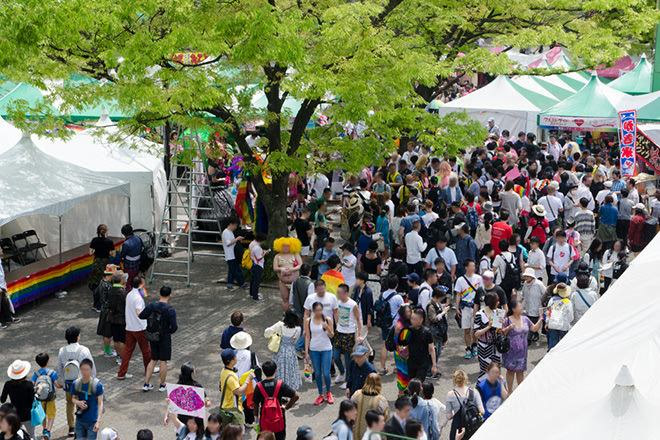
I was surprised because I didn't expect so many people to come.
The total number of attendees was 100,000, the highest ever (last year it was about 70,000). It is one of the largest LGBT events in Japan, and is attracting more and more attention every year.
The venue had a stage for the main event, and a wide variety of booths were set up, including food and drink stalls, corporate booths, and NPOs.
There was also a student interaction space and job-hunting support booths, and the overall impression was that it was targeted at young people.
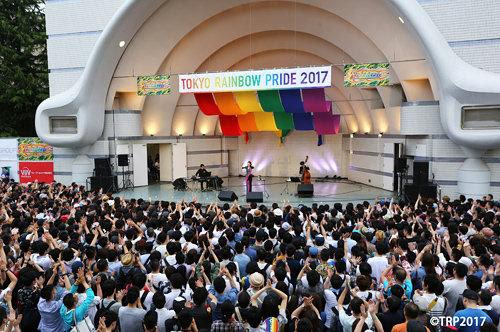
On the final day of the main stage there was a free live performance by singer Mika Nakashima!
The parade, the main event of TRP, began in the afternoon.
This year, there were a whopping 5,000 participants! 23 groups of floats and marching bands participated. The route went from Koen-dori to Meiji-dori, to Harajuku, and back to Yoyogi Park.
Everyone who participated was very lively and I was impressed by how they walked with pride, as the event's name suggests.
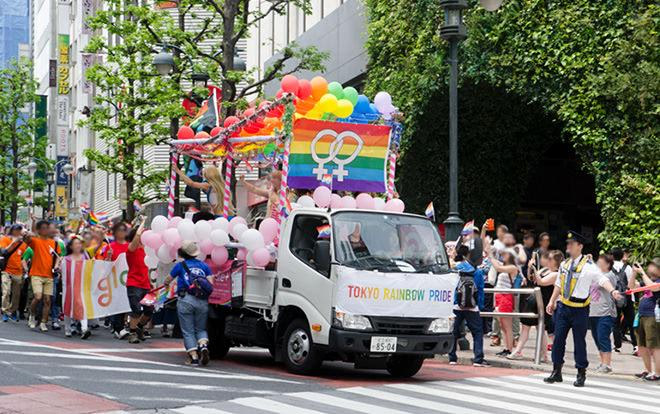
The colorful floats will liven up the parade!
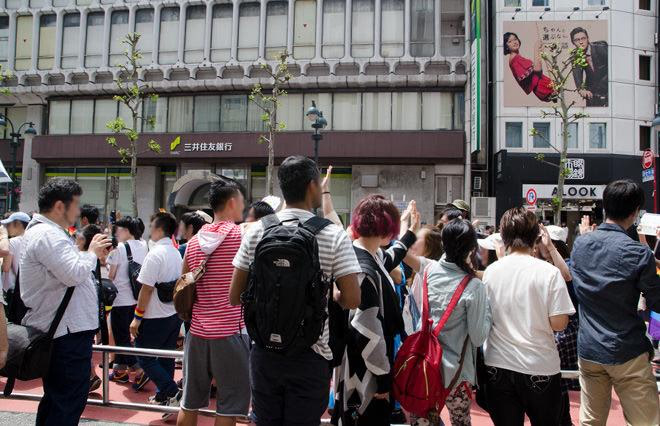
There were many people along the route, taking photos and high-fiving the parade participants.
Because the event was about the sensitive topic of LGBT, I was unsure how to cover it. However, when I actually went, the atmosphere was very bright and cheerful, and even though it was my first time participating, I enjoyed it like it was a festival. It was an event that gave a positive impression of LGBT.
-Please tell us how even first-time participants can enjoy TRP.
Ochazuke: How about shopping? There are lots of cute miscellaneous goods. There are also goods that represent each sexuality, and the shop staff are happy to explain them to you.
There are quite a few shops in 2-chome, and there are also bars, so you can have fun eating delicious food and drinking a variety of alcoholic drinks.
Even if you don't intend to study, it's fine to just go to the festival in Yoyogi Park. If you don't have any knowledge about LGBTs, you might make discriminatory remarks like "That's gay," so it might be better to gain some knowledge before coming.
But I think it's okay to come by casually, and it might spark your interest.
